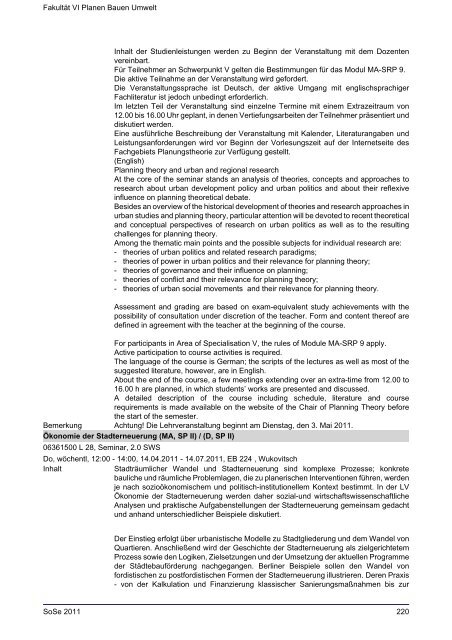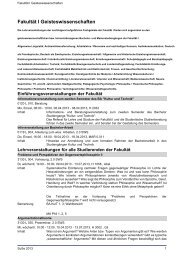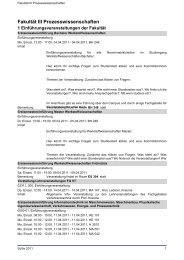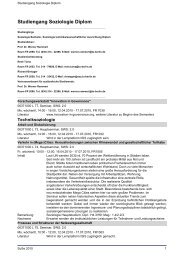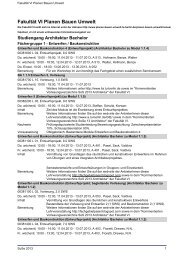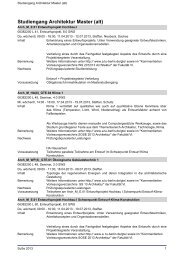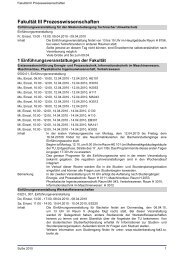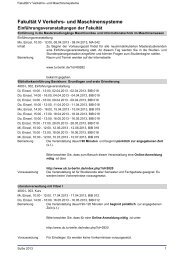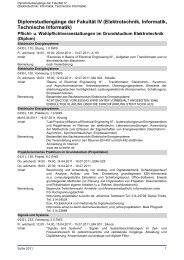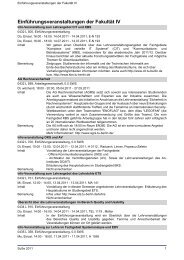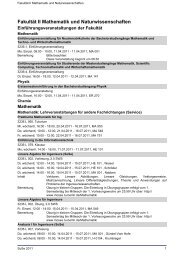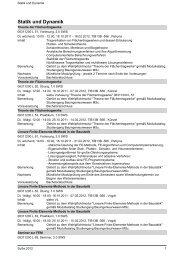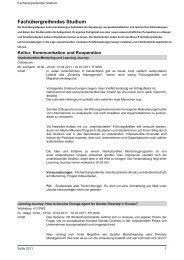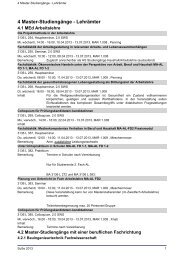Fakultät VI Planen Bauen Umwelt - TU Berlin
Fakultät VI Planen Bauen Umwelt - TU Berlin
Fakultät VI Planen Bauen Umwelt - TU Berlin
Sie wollen auch ein ePaper? Erhöhen Sie die Reichweite Ihrer Titel.
YUMPU macht aus Druck-PDFs automatisch weboptimierte ePaper, die Google liebt.
<strong>Fakultät</strong> <strong>VI</strong> <strong>Planen</strong> <strong>Bauen</strong> <strong>Umwelt</strong><br />
Inhalt der Studienleistungen werden zu Beginn der Veranstaltung mit dem Dozenten<br />
vereinbart.<br />
Für Teilnehmer an Schwerpunkt V gelten die Bestimmungen für das Modul MA-SRP 9.<br />
Die aktive Teilnahme an der Veranstaltung wird gefordert.<br />
Die Veranstaltungssprache ist Deutsch, der aktive Umgang mit englischsprachiger<br />
Fachliteratur ist jedoch unbedingt erforderlich.<br />
Im letzten Teil der Veranstaltung sind einzelne Termine mit einem Extrazeitraum von<br />
12.00 bis 16.00 Uhr geplant, in denen Vertiefungsarbeiten der Teilnehmer präsentiert und<br />
diskutiert werden.<br />
Eine ausführliche Beschreibung der Veranstaltung mit Kalender, Literaturangaben und<br />
Leistungsanforderungen wird vor Beginn der Vorlesungszeit auf der Internetseite des<br />
Fachgebiets Planungstheorie zur Verfügung gestellt.<br />
(English)<br />
Planning theory and urban and regional research<br />
At the core of the seminar stands an analysis of theories, concepts and approaches to<br />
research about urban development policy and urban politics and about their reflexive<br />
influence on planning theoretical debate.<br />
Besides an overview of the historical development of theories and research approaches in<br />
urban studies and planning theory, particular attention will be devoted to recent theoretical<br />
and conceptual perspectives of research on urban politics as well as to the resulting<br />
challenges for planning theory.<br />
Among the thematic main points and the possible subjects for individual research are:<br />
- theories of urban politics and related research paradigms;<br />
- theories of power in urban politics and their relevance for planning theory;<br />
- theories of governance and their influence on planning;<br />
- theories of conflict and their relevance for planning theory;<br />
- theories of urban social movements and their relevance for planning theory.<br />
Assessment and grading are based on exam-equivalent study achievements with the<br />
possibility of consultation under discretion of the teacher. Form and content thereof are<br />
defined in agreement with the teacher at the beginning of the course.<br />
For participants in Area of Specialisation V, the rules of Module MA-SRP 9 apply.<br />
Active participation to course activities is required.<br />
The language of the course is German; the scripts of the lectures as well as most of the<br />
suggested literature, however, are in English.<br />
About the end of the course, a few meetings extending over an extra-time from 12.00 to<br />
16.00 h are planned, in which students’ works are presented and discussed.<br />
A detailed description of the course including schedule, literature and course<br />
requirements is made available on the website of the Chair of Planning Theory before<br />
the start of the semester.<br />
Bemerkung Achtung! Die Lehrveranstaltung beginnt am Dienstag, den 3. Mai 2011.<br />
Ökonomie der Stadterneuerung (MA, SP II) / (D, SP II)<br />
06361500 L 28, Seminar, 2.0 SWS<br />
Do, wöchentl, 12:00 - 14:00, 14.04.2011 - 14.07.2011, EB 224 , Wukovitsch<br />
Inhalt Stadträumlicher Wandel und Stadterneuerung sind komplexe Prozesse; konkrete<br />
bauliche und räumliche Problemlagen, die zu planerischen Interventionen führen, werden<br />
je nach sozioökonomischem und politisch-institutionellem Kontext bestimmt. In der LV<br />
Ökonomie der Stadterneuerung werden daher sozial-und wirtschaftswissenschaftliche<br />
Analysen und praktische Aufgabenstellungen der Stadterneuerung gemeinsam gedacht<br />
und anhand unterschiedlicher Beispiele diskutiert.<br />
Der Einstieg erfolgt über urbanistische Modelle zu Stadtgliederung und dem Wandel von<br />
Quartieren. Anschließend wird der Geschichte der Stadterneuerung als zielgerichtetem<br />
Prozess sowie den Logiken, Zielsetzungen und der Umsetzung der aktuellen Programme<br />
der Städtebauförderung nachgegangen. <strong>Berlin</strong>er Beispiele sollen den Wandel von<br />
fordistischen zu postfordistischen Formen der Stadterneuerung illustrieren. Deren Praxis<br />
- von der Kalkulation und Finanzierung klassischer Sanierungsmaßnahmen bis zur<br />
SoSe 2011 220


